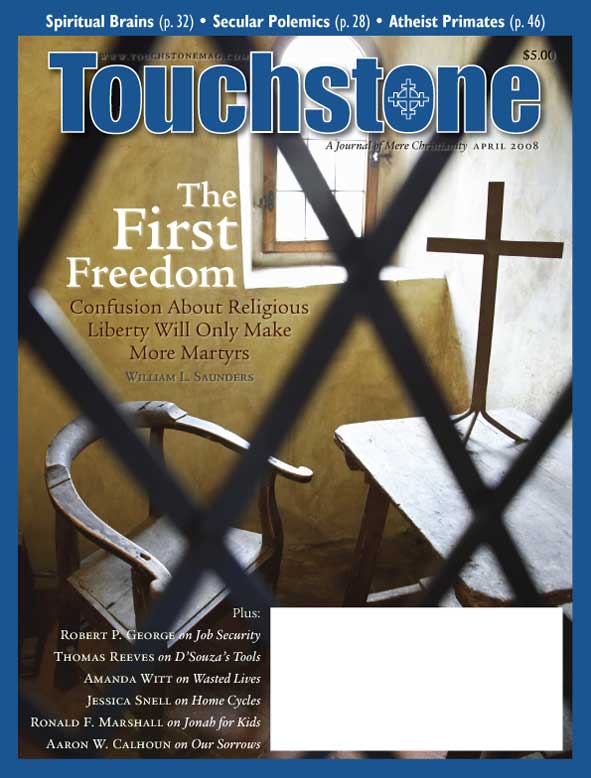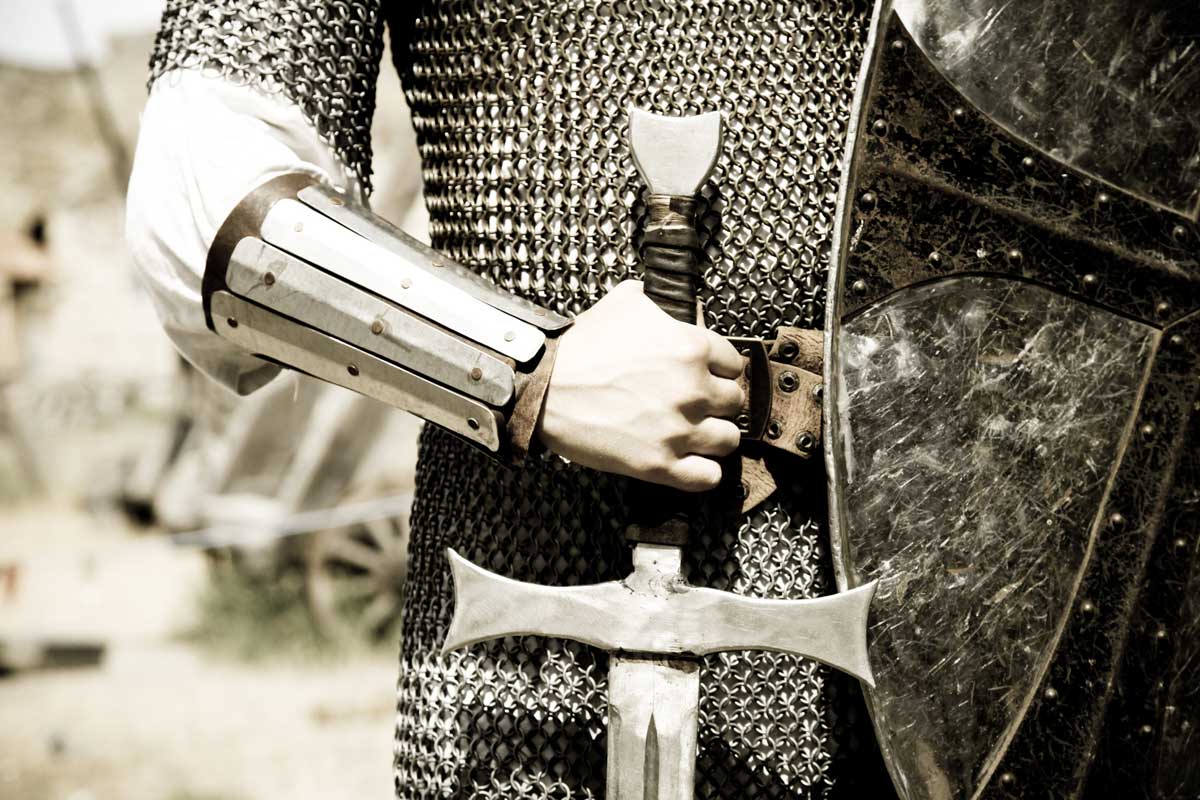The Tool Kit
What’s So Great About Christianity
by Dinesh D’Souza
Regnery Publishing, 2007
(348 pages, $27.95, hardcover)
reviewed by Thomas C. Reeves
After reading several new volumes on atheism that have stirred the media and hit the best-seller lists, the conservative scholar Dinesh D’Souza set out to make the case for Christianity, the “mere Christianity” practiced by most of the faithful in all churches. What’s So Great About Christianity is overtly polemical, designed to be “a kind of tool kit for Christians” and an invitation to all concerned to convert. “I hope,” the author writes, “you will read it as if your life depended on it, because, in a way, it might.”
Civilization’s Foundation
D’Souza makes a case for seven propositions: (1) That Christianity is the “main foundation” of Western Civilization and “the root of our most cherished values”; (2) that evidence from modern science supports the Christian claim that a divine being created the universe; (3) that Darwin’s theory of evolution strengthens the evidence for supernatural design; (4) that nothing in science makes miracles impossible; (5) that faith and reason are totally compatible; (6) that atheism, far more than religion, has produced mass murder; and (7) that atheism is motivated by “a kind of cowardly moral escapism.” No small task for only 316 pages of text.
The author’s examination of early Christian history, while absolving Christianity of the decline and fall of the Roman Empire, notes that the faith brought into the world a high sense of personal morality; an elevation of the status of women, monogamous love, and the family; an exaltation of the common man (each person’s soul being of equal importance in the eyes of God, and each individual being a moral agent); and a powerful consideration of the needs of others. Later on, Christianity laid the groundwork for democracy, the anti-slavery movement, capitalism, and “all modern doctrines of human rights.”
But didn’t the Enlightenment and its free thinkers create our modern freedoms? No. “John Stuart Mill’s influential doctrine of liberty, which so many of us take for granted, is a direct inheritance from Christianity.” D’Souza writes:
It is no use responding that Mill was a product of the Enlightenment understanding of human freedom and equality. That notion was itself a product of Christianity. Where else do you think the Enlightenment thinkers got it?
Individual rights stem from the Christian premise “that all human lives have worth and that all lives count equally; this is not the teaching of all the world’s cultures and religions.” In the pre-Christian world, only Athens permitted its citizens a voice in the decisions of their own polity, and that was a society dependent on slavery.
The Christian view of freedom and equality is firmly rooted in Scripture (e.g., Galatians 3:28), which teaches that all of us are free moral agents, architects of our own lives. This was an awesome contribution to the history of humanity.
Christian Science
Modern science too, has its roots in Christianity. “An unbiased look at the history of science shows that modern science is an invention of medieval Christianity, and that the greatest breakthroughs in scientific reason have largely been the work of Christians.” The list of influential Christian scientists includes Copernicus, Kepler, Galileo, Brahe, Descartes, Faraday, Lavoisier, Priestley, Pasteur, Planck, and Mendel.
But didn’t the Catholic Church persecute Galileo, Copernicus, and other brave scientists? In fact, Copernicus was never persecuted by the church.
The Galileo case was a complex matter: “the geocentric universe was a classical, not a Christian concept,” and the best evidence in Galileo’s time rejected the heliocentric alternative. Moreover, the condemnation of his scientific theory, which had very little impact on the scientist or his research, marks the only time there was a break in the harmonious relationship between Christianity and science.
D’Souza continues, “Prior to the twentieth century and the purges of Stalin and Hitler, only one noted scientist was executed by government decree. That was the great chemist Antoine Lavoisier, a devout Catholic who was guillotined by the Jacobins during the French Revolution.” The familiar story of science versus religion, D’Souza contends, is nonsense invented by historical fabricators and anti-Christian polemicists in the nineteenth century.
The author accepts the theory of evolution, but he rejects the Darwinian “fundamentalists” who employ it to deny the existence of God. Evolution, he notes, cannot explain the origins of life, human rationality and morality, and the whole signature of design evident to all but the atheists.
“For the Christian,” he argues, “the evolution debate comes down to competing theories about how God did it. . . . Instead of suing to get theories of creationism and intelligent design into the science classroom, Christians should be suing to get atheist interpretations of Darwin out.”
Atheism’s Revolt
Another impressive argument involves the comparative historical record of atheists and Christians. Following a detailed historical comparison, D’Souza concludes, “Even taking higher population levels into account, atheist violence surpasses religious violence by staggering proportions. . . . [T]hese deaths caused by Christian rulers over a five-hundred-year period amount to only 1 percent of the deaths caused by Stalin, Hitler and Mao in the space of a few decades.”
D’Souza argues that atheism is less an intellectual reaction than a moral revolt, a rebellion against such Christian virtues as heterosexual, monogamous love and the sacredness of human life. The denial of God is designed primarily to assuage the conscience. “Atheists don’t find God invisible so much as objectionable. They aren’t adjusting their desires to the truth, but rather the truth to fit their desires.”
That the book is, as here, consistently lively and controversial is among its virtues. It deserves widespread attention. Indeed, it may well become a Christian classic.
Thomas C. Reeves is a retired history professor who lives with his wife Kathleen in the Wisconsin countryside. Among his numerous books are biographies of John F. Kennedy and Fulton J. Sheen. His latest book is Distinguished Service: The Life and Times of Wisconsin Governor Walter J. Kohler, Jr. (Marquette University Press).
subscription options
Order
Print/Online Subscription

Get six issues (one year) of Touchstone PLUS full online access including pdf downloads for only $39.95. That's only $3.34 per month!
Order
Online Only
Subscription

Get a one-year full-access subscription to the Touchstone online archives for only $19.95. That's only $1.66 per month!
bulk subscriptions
Order Touchstone subscriptions in bulk and save $10 per sub! Each subscription includes 6 issues of Touchstone plus full online access to touchstonemag.com—including archives, videos, and pdf downloads of recent issues for only $29.95 each! Great for churches or study groups.
Transactions will be processed on a secure server.
more from the online archives
calling all readers
Please Donate
"There are magazines worth reading but few worth saving . . . Touchstone is just such a magazine."
—Alice von Hildebrand
"Here we do not concede one square millimeter of territory to falsehood, folly, contemporary sentimentality, or fashion. We speak the truth, and let God be our judge. . . . Touchstone is the one committedly Christian conservative journal."
—Anthony Esolen, Touchstone senior editor









